This post was written by Gregory Paylor ’18
In the US, health insurance coverage was broadened and expanded under The Affordable Care Act. While this reduced the total uninsured population, cost per unit of care went unaddressed and the model of healthcare delivery has remained largely unchanged. Only recently have we begun to see payment model initiatives attempting to address healthcare payment reform and improvement to patient outcomes. Because of this, insurers have been looking for other ways to reduce downstream healthcare spending. This is where the Social Determinants of Health (SDOH) come into play.
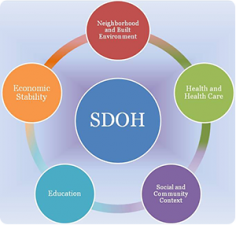 The World Health Organization (WHO) defines SDOH as “the conditions in which people are born, grow, live, work and age. These circumstances are shaped by the distribution of money, power and resources at global, national and local levels. The social determinants of health are mostly responsible for health inequities – the unfair and avoidable differences in health status seen within and between countries.” Examples of SDOH include: safe housing, food availability, segregation, exposure to crime, presence of trash, transportation options, and the natural environment.
The World Health Organization (WHO) defines SDOH as “the conditions in which people are born, grow, live, work and age. These circumstances are shaped by the distribution of money, power and resources at global, national and local levels. The social determinants of health are mostly responsible for health inequities – the unfair and avoidable differences in health status seen within and between countries.” Examples of SDOH include: safe housing, food availability, segregation, exposure to crime, presence of trash, transportation options, and the natural environment.
Massachusetts, New York, Oregon, Utah, and Vermont are all “testing strategies not only to link Medicaid and social services, but also to use Medicaid funds to actually deliver supportive services that affect social determinants of health. These value-based delivery system reforms include the creation of accountable care organizations, health homes, community health teams, and accountable communities for health.”
Rather than waiting for patients to come into the ER or be seen when a problem manifests, developing a network of community partners to proactively engage healthcare consumers is a preventative strategy that is important to take note of. Insurers are making a point to positively influence the social conditions of its members as a way to save money on medical bills that could potentially occur. This type of upfront investment has the potential to bring down healthcare spending while improving the health of underserved and vulnerable patient populations.

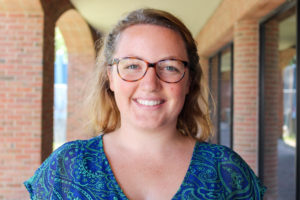 I chose to attend The Sustainable Innovation MBA program because I wanted to gain the skills necessary to have a productive role in my family’s business. The program drew my attention because of its small size and focus on sustainability and entrepreneurship.
I chose to attend The Sustainable Innovation MBA program because I wanted to gain the skills necessary to have a productive role in my family’s business. The program drew my attention because of its small size and focus on sustainability and entrepreneurship.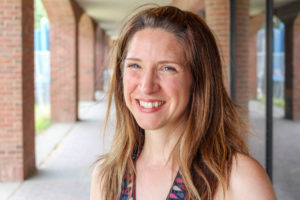
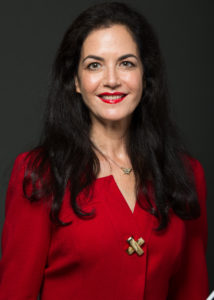 I have been a practicing lawyer in various areas of corporate life and a wildly eclectic number of industries (private investments, finance, airlines, manufacturers, software, telecommunications, real estate, mining, retail, etc.). Much of what I have done professionally has been interesting, challenging, and often fun, and my experience has given me terrific insight into how all sorts of industries and businesses work and myriad points of view that may come to bear on a question, but I was ready to make a change and to play a different role.
I have been a practicing lawyer in various areas of corporate life and a wildly eclectic number of industries (private investments, finance, airlines, manufacturers, software, telecommunications, real estate, mining, retail, etc.). Much of what I have done professionally has been interesting, challenging, and often fun, and my experience has given me terrific insight into how all sorts of industries and businesses work and myriad points of view that may come to bear on a question, but I was ready to make a change and to play a different role.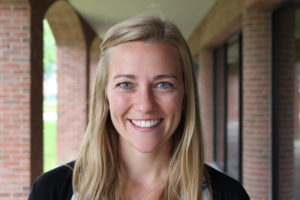 I work in NYC as an Associate Director at
I work in NYC as an Associate Director at 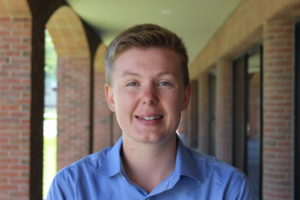 Making a whole new life for myself! I launched my own consulting practice, Third Peak Solutions, and spent much of the fall working from the road while my partner and I traveled around the west (Washington, Oregon, Montana, Wyoming, Colorado and New Mexico) figuring out a new place to call home. In November my partner landed a position at a very cool organization called Adventure Scientists and just after Thanksgiving we moved to Bozeman, Montana. After spending 30 years living in the Northeast, moving to big sky country is a pretty big life change. It’s somewhat terrifying, but mostly thrilling. Now that I’m settling into my new home, I’m focused on defining exactly what Third Peak Solutions does: organizational development consulting with conservation non-profits? Sustainable strategy consulting with for-profits? A little bit of both?
Making a whole new life for myself! I launched my own consulting practice, Third Peak Solutions, and spent much of the fall working from the road while my partner and I traveled around the west (Washington, Oregon, Montana, Wyoming, Colorado and New Mexico) figuring out a new place to call home. In November my partner landed a position at a very cool organization called Adventure Scientists and just after Thanksgiving we moved to Bozeman, Montana. After spending 30 years living in the Northeast, moving to big sky country is a pretty big life change. It’s somewhat terrifying, but mostly thrilling. Now that I’m settling into my new home, I’m focused on defining exactly what Third Peak Solutions does: organizational development consulting with conservation non-profits? Sustainable strategy consulting with for-profits? A little bit of both?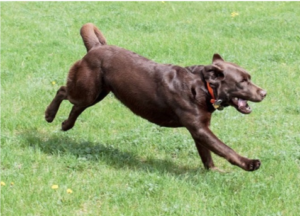 Fortunately for us at The Sustainable Innovation MBA, we don’t have to wait until we get home to experience this joy. Meet Willy Wonka, a 3-year-old chocolate lab who has bounded into Kalkin 110 as our 31st classmate during Professor Erik Monsen’s “Crafting the Entrepreneurial Business Model” class.
Fortunately for us at The Sustainable Innovation MBA, we don’t have to wait until we get home to experience this joy. Meet Willy Wonka, a 3-year-old chocolate lab who has bounded into Kalkin 110 as our 31st classmate during Professor Erik Monsen’s “Crafting the Entrepreneurial Business Model” class.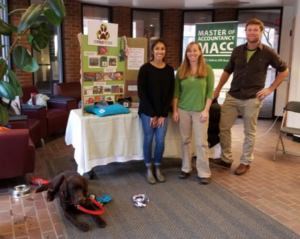 Willy Wonka doesn’t just demonstrate his value around the house. His “dad” is a professor of entrepreneurship, so naturally he has a few different jobs. As a certified therapy dog, Willy Wonka can be seen around campus during exam season providing stress relief to students. When he’s off-campus, you may be able to spot him at your local library, where children read to him. He loves a great story, but it’s hard to know exactly what his favorite genre is. He was even a tester for last year’s cohort’s recycled dog toy company, RePawposed.
Willy Wonka doesn’t just demonstrate his value around the house. His “dad” is a professor of entrepreneurship, so naturally he has a few different jobs. As a certified therapy dog, Willy Wonka can be seen around campus during exam season providing stress relief to students. When he’s off-campus, you may be able to spot him at your local library, where children read to him. He loves a great story, but it’s hard to know exactly what his favorite genre is. He was even a tester for last year’s cohort’s recycled dog toy company, RePawposed.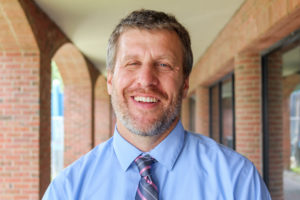 It’s a fantastic opportunity for those seeking to pivot mid-career. Prior to The Sustainable Innovation MBA, I worked in agriculture and non-profits and I had reached a point where opportunities for learning and advancement had flattened out. As a working parent of two young girls, the thought of being in graduate school for years on was overwhelming. The one-year curriculum is perfect for those looking to re-launch their careers quickly.
It’s a fantastic opportunity for those seeking to pivot mid-career. Prior to The Sustainable Innovation MBA, I worked in agriculture and non-profits and I had reached a point where opportunities for learning and advancement had flattened out. As a working parent of two young girls, the thought of being in graduate school for years on was overwhelming. The one-year curriculum is perfect for those looking to re-launch their careers quickly.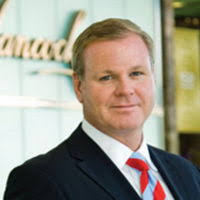 Mr. Arnott describes his background as somewhat atypical among public company CEOs in that he had lots of operations experience, but relatively little formal leadership training, when he started as CEO. His style is therefore largely self-taught, but I was not surprised that his sentiments echoed what The Sustainable Innovation MBA has taught us so far.
Mr. Arnott describes his background as somewhat atypical among public company CEOs in that he had lots of operations experience, but relatively little formal leadership training, when he started as CEO. His style is therefore largely self-taught, but I was not surprised that his sentiments echoed what The Sustainable Innovation MBA has taught us so far.